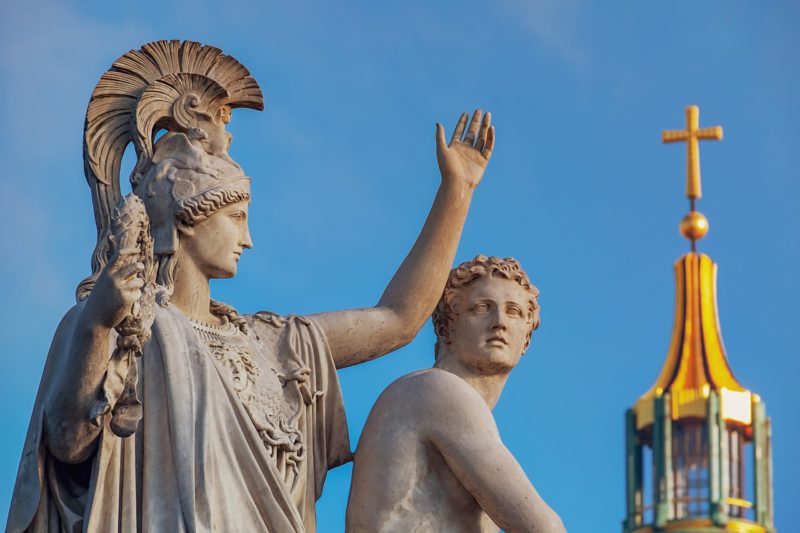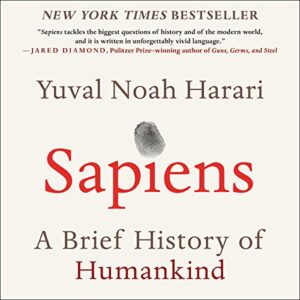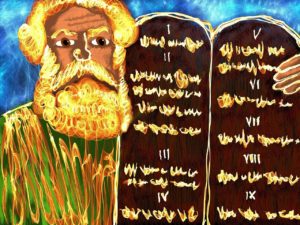There are many ways to classify religions, one way is to divide them into monotheism and polytheism.
The difference between monotheism and polytheism can be said to be literal, or for the moment, “whether one believes in only one god or many gods”.
*In reality, there is a difference between “Monolatry” which recognizes many gods and believes in one god, and “monotheism,” which does not recognize any other gods and believes in one god.
Particularly after 9/11, the opposition to Islamic fundamentalism and Christian fundamentalism led to the development of the theory of the supremacy of polytheism, which asserted that monotheism is intolerant because it does not recognize other religions.
In this essay, I would like to discuss the difference between monotheism and polytheism, whether polytheism is really tolerant, whether Buddhism is polytheistic, and the possibility of a “Philosophy of Unity is Whole, Whole is Unity” that would truly eliminate religious conflicts from the world.
Polytheism is not always tolerant?
As mentioned earlier, there is a theory that “polytheism is more tolerant and desirable” to the effect that “Semitic monotheistic religions such as Christianity and Islam are intolerant and aggressive because they do not recognize other religions. This is the “polytheism superiority theory.
In response to this, some have countered by giving several examples of polytheism’s exclusion of other religions, saying that this is not true and that polytheism also has a non-tolerant side.
For example, the historical fact that the Soga and Mononobe clans fought fiercely in the introduction of Buddhism to Japan, the exclusion of other religions by the Nichiren sect (Buddhism), the suppression of Christianity in the Edo period, the movement to abolish Buddhism in the Meiji period, and more recently, the Rohingya, Muslims in Myanmar, who are being suppressed by Buddhists.
Thus, well, surely, if we wanted to find examples of polytheism’s exclusion of other religions, we could find a number of them.
However, considering the history of bloody wars, inquisition, witch hunts, massacres for religious reasons in colonies, etc. by monotheistic religions since the establishment of monotheism (for the time being, we consider it after Judaism), it may be said that the total number of cases of monotheism attacking other religions (other sects) is by far the largest.
But what about the Middle East in ancient times? The Middle East is and always has been at war.
Assyria, New Babylonia, Egypt…to name a few that come to mind, you will notice that almost all of them adopted polytheism. Almost the only exception is Israelite Judaism, which is monotheistic.
I write “almost” because there are a few exceptions. During the New Kingdom of Egypt, a king named Amenhotep IV reformed the monotheistic religion with “Aten” as the sole god. He even deliberately changed his own name to “Aquen Aten.
However, this reform lasted only one generation.
There is a view that this belief in the god Aten (monotheism) may have actually planted the memory of monotheism in the Hebrews who were in Egypt at the time, and that this may have been the origin of Judaism, but I will not go into this in depth this time.
The difficult part of this discussion is to determine the extent to which the conflict is based on dogma, and whether it is a conflict that is more political than religious.
The Thirty Years’ War in Germany, which is considered a representative religious war, was a struggle between Catholics and Lutherans, but it was not only a dogma-based conflict, but also a secular power struggle between the Pope and feudal lords, or between feudal lords.
The same is true of the conflict between the Soga and Mononobe clans. It has a strong flavor of political struggle. It is difficult to discern.
On the other hand, there may be examples of “political” but preceded by an ideological struggle. Ideology is also a dogma in a broad sense.
As you can see, there are many possibilities, but one thing that can be said is that there is little that can be called dogma in polytheism in the first place.
Can you think of any Shinto doctrines? Most of the didactic words on omikuji are borrowed from Confucianism and Buddhism, aren’t they?
What were the teachings of the ancient Greek and Roman (pre-Christian) gods? What were the teachings of Zeus and Jupiter…?
We can’t think of these either, can we?
So, rather than polytheism being tolerant, it can be said that there is no dogma to begin with, so there can be no dogma-based conflict.
Can polytheism and monotheism be spoken of on the same ground?
Therefore, it can be said that a religious war based on dogma cannot occur in a polytheistic religion that has no dogma.
It makes me wonder if polytheistic superiority theory might be “religious irrelevance” in disguise for dogma-hating/religion-hating theorists.
So the theory that “polytheism is superior to monotheism because it is more tolerant and less aggressive, and therefore more desirable,” the polytheism superiority theory, I personally disagree with this.
I even question, in the first place, whether monotheism and polytheism can be compared on the same ground.
As I have already mentioned, most polytheistic religions do not have a “doctrine.
It seems to me that polytheism is probably more about customs, culture, and various rites of passage (birth, marriage, funerals, etc.), and is not a subject for people to seek ethical norms from it (polytheism), nor is it even supposed to play such a role in the first place.
I think that polytheism, if you will, is the accumulation of myths and customs of a people.
So, for example, even in ancient Greece and ancient Rome (except during the Christian nationalistic period), polytheism was an object of worship, but the ethical foundation of the people was rather Greek philosophy.
Both Socrates (Plato) and Marcus Aurelius pay homage to the “gods,” but for Socrates (Plato), the foundation is the Idea theory and the “consideration of the soul” derived from it, and for Aurelius, it is Stoic philosophy, which is his foundation.
What is the function of dogma?
Of course, these monotheistic religions, as seen in Christianity and Islam, are also involved in various rites of passage in life. They are also deeply rooted in terms of culture and customs. In fact, for those who are not so religious, it can be said that they are not so different from Buddhist rituals for the Japanese.
Nevertheless, in monotheism, we can always return to the “one-to-one dialogue with God”. Because of the dogma, we can seek ethical norms there.
In fact, I think this is precisely where we should look for the most important characteristics of monotheism.
It is a “one-on-one dialogue with God” and “ethical norms.”
What makes all this possible is that, after all, man is not the center in the worldview, but the divine reality. That is why it can become the “norm”.
Conversely, it can be said that polytheism without a doctrine cannot be an ethical norm in the first place because there is no doctrine, and another viewpoint is that “polytheism can easily fall into a human (ego)-centered worldview.
Even when people go to shrines to worship, they may ask for their wishes to be granted based on human desires or receive spiritual power, etc. No matter how much they worship, the underlying concept is a “human (ego)-centered worldview” in which people seek to have God do something for them.
Let’s get this straight.
- Monotheism: Divine existence-centered worldview
- Polytheism: Ego-centered worldview
That is, monotheism and polytheism are not a matter of “different numbers of gods,” but rather the opposite in their worldviews to begin with.
It is just like the analogy between heavenly motion theory and geocentric theory.
As an image of whether human beings are moving around the divine reality or the divine reality is moving around human beings, you can clearly see the difference if you imagine it in terms of geocentric and heliocentric.

In the age of the awakening of the “individual,” a worldview centered on divine existence is required
In tribal or kinship societies, there are natural norms in the relationship between the self and the social group.
There are unspoken social codes, village society rules and customs, and a sense of homogeneous social security. There, ethical norms would center on ancestor worship, for example.
Unlike modern societies, individual freedom is limited, but there is also comfort because freedom is restrictive.
However, the situation is different in modern society, or rather, in imperial or urban society, where the awakening of the individual is promoted.
In an imperial society, a state of intermingling of various ethnic groups is created. A similar situation arises in urban-type societies triggered by the development of commerce. It could be described as “a society where neighbors are heterogeneous.
In such a society, individual freedom is promoted, but on the other hand, the individual must literally be alone.
No longer can we expect the security and natural norms of tribal and blood-ground societies.
In such a solitary society, where individual independence is encouraged without restraint, and where individuals are punished for their freedom, they will want to find a place where their hearts and minds are based.
And the more absolute the spiritual ground is, the more secure it will be as a norm.
This is where the “divine reality-centered worldview” mentioned earlier comes into demand.
In “Sapiens” Yuval Noah Harari argues that as time goes by, “three devices will be created: empire, money, and world religion,” and these three are indeed closely related.
*However, Neo Buddhism does not agree with the basic assertions of “Sapiens” itself.
Now, some may object that “imperial” or “urban” Islam, for example, has a different starting point.
It has often been (especially in the past) referred to as “desert monotheism. And it has also been argued that monotheism developed in the Middle East because of the harsh natural environment and the mixture of empires and religions.
However, if you check the history carefully, you will find that the ancient Middle East – Mediterranean region was rather predominantly polytheistic. Babylonia, Assyria, New Babylonia, Egypt, Greece, Rome….
So Muhammad’s time was rather one of transition, historically speaking, when there was a struggle between Sasanian Persia and the Byzantine Empire, and the center of commerce and trade drifted to the Arabian Peninsula.
The Arabs were originally a tribal society, but they were shifting to an urban society as if pushed by the “wave of commerce”. Mecca (Makkah) at that time was in the midst of such a transition.
And conventional polytheism became unable to solve various discrimination and poverty problems…and by extension, “problems of the heart”.
The reason why Islam was able to sweep through the Arabian Peninsula so rapidly is, I believe, because of the demand (even if unconsciously) for a worldview centered on divine reality.
So is Christianity.
Within the Roman Empire, Christians had been greatly persecuted many times as rebels, but by the time of Emperor Constantine, the number of believers had increased to the point where they could no longer be held back.
Why was this so?
After all, I think that here, too, polytheism is no longer able to respond to the “awakening of the individual.
And for a one-to-one dialogue with the divine reality, the greater the absoluteness of the divine reality, the stronger the sense of stability. I think that this means that Stoic philosophy and other philosophies no longer had enough of that intensity.
On the other hand, Judaism is a monotheistic religion (and it can be said to be the starting point of monotheism), but Judaism chose to remain an ethnic religion, which could not meet the demands of the imperial people. So Christianity exploded to such an extent that there was no other way but to officially recognize it, I think.
Now, as for Buddhism, I think it is often said to be polytheistic as a classification, well, yes, it does seem that way because it also recognized the Brahmin gods (of the time) in one way or another.
The teachings of the Buddha are, after all, “Dharma-centric”.
And as the Buddhist scriptures say, “He who sees the Dharma sees the Buddha,” this would eventually lead to a “Buddha-centered” worldview, which would be consistent with the “divine-reality-centered worldview” mentioned earlier.
The Buddha’s time was also a period of transition to an urban society with rapid development of commerce and industry.
And especially in the age of Mahayana Buddhism, the “Eternal Buddha” or “Amitabha Buddha” took on a monotheistic absoluteness.
That is why we call it urban-type, after all, empires and cities are societies with “heterogeneous neighbors,” which inevitably promotes the “awakening of the solitary individual.
Since people fundamentally cannot endure solitude, they will therefore desire an “absolute norm” on which to base their minds. Therefore, a monotheistic, “God-centered worldview” is demanded. That is what I believe.
The society we live in today (especially in developed countries) is also a world of “solitary individuals” that can no longer be sustained by tribal solidarity, right? So, essentially, monotheistic principles are called for.
As for Japan, although it is almost the same people and highly homogeneous, it is also in a period of confusion because the last World War has largely negated the “monotheistic” emperor-worshipping values.
And I see that idols, underground idols, and easy self-help books are being consumed one after another as substitutes for the Absolute God.
However, I believe that even in Japan, a “divine reality-centered worldview” is potentially required for true happiness.
A “divine-reality-centered worldview” does not have to be a “religion” in the so-called narrow sense of the word. The point is to obtain absolute, principle-centered values.
In conclusion, it would seem that the world still wants a “divine-reality-centered worldview”.
It is no coincidence that monotheistic religions such as Christianity and Islam alone account for 2/3 of the world’s population.
As mentioned earlier, Buddhism also has a “Dharma-centered” monotheistic principle, so the percentage of the population that adheres to monotheistic principles will further increase.
And to the age of “One is Many, Many is One” Philosophy
Therefore, as I have mentioned in detail, I believe that we modern people, who are remarkably “awakening to the individual,” are in need of a divine reality-centered value system that can serve as an absolute ethical norm, in other words, a monotheistic principle.
Now, having said that, the (dogmatic) intolerance of monotheism will remain a problem, as I mentioned at the beginning of this article.
Therefore, I would like to propose a “One is Many, Many is One Philosophy” that dialectically sublates polytheism and monotheism on this site (Neo-Buddhism).
The number one is not so simple that it can be called anything but one.
It is possible to include “many” within the “one.
For example, suppose we have a lump of clay here. It is one in number, right?
However, if you tear off one piece of clay, it can become “many. And conversely, if you knead the many together, the clay can return to being one again.
Thus, the one is not simply one, but can have the perspective of “one in the inclusion of many.
Let us replace this with religion.
The essential God is one.
However, even the One God appears on earth in various unique ways depending on the time period, region, ethnicity, and so on. Or, people on earth respond to the One God in various ways.
This is the reason why various religions have appeared on earth.
However, due to the narrowness of human vision, it is a historical fact that “Christianity and Buddhism are different,” “Islam and Buddhism are incompatible,” etc., and have been at odds with each other.
This opens up the possibility of “One is Many, Many is One Philosophy” which recognizes the existence of various religions (i.e., many) as differences, but at the same time recognizes that the fundamental way of being is one.
For example, even if one belongs to a particular religious group, it can be said that it is an ideology and spirituality that respects other religions, saying that they were originally divided from the same fundamental creator God, instead of dismissing them as “different.
Neo Buddhism believes that this “One is Many, Many is One Philosophy” should be the view of God demanded by the society of the next generation.
However, “one is many” is not as simple as the clay example above, which can be reduced to a lump.
The various religions can continue to exist with their own individuality. No, rather, they should be.
Otherwise, religions would not be able to meet the various needs of human beings on earth.
However, I am saying that differences can be integrated into one from a higher perspective.
For example, there is one earth, but there are various nations within it.
From a country-level perspective, “country A is different from country B”.
However, if we raise the level of abstraction to that of a “planet,” we can see that the earth is a single planet that encompasses a variety of nations with their own characteristics, and that the earth is “one (earth) and many (various nations).

I think religion should be considered in the same way.
The idea is that although there is one ultimate God, He only appears in various religions that are unique to different times, regions, and ethnicities, and that the ultimate God is the same God, albeit with a different name.
This is the “One is Many, Many is One” philosophy.
In Neo Buddhism, we are proud of the fact that we are not only chanting the empty nembutsu, “The origin is the same,” but we are also clarifying the three-dimensional structure of “how exactly it can be synthesized into “one.
Speaking of Buddhism and Christianity, see, for example, the following article.
*Reference article: Buddhism and Christianity – Theory to Overcome Differences and Extract Similarities
If such a view is shared among the major religions of the earth, we will be able to demonstrate “tolerance” in respecting other religions and sects, while ensuring an “absolute norm of ethics” derived from the “divine reality-centered values” of monotheistic religions.
Neo Buddhism hopes to continue to advocate many such possibilities for the “One is Many, Many is One” philosophy











Comments